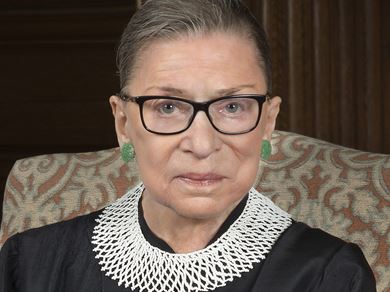
- Faith: Judaism
- Career: Politician
- Birthday: March 15, 1933
- Date of Death: September 18, 2020
Ruth Bader Ginsburg, often referred to as RBG, left an indelible mark on American jurisprudence through her profound legal career, unwavering commitment to gender equality, and the influence of her Jewish faith. Born Joan Ruth Bader on March 15, 1933, in Brooklyn, New York, she navigated the challenges of her time with remarkable resilience and determination.
Ruth Bader Ginsburg’s upbringing was shaped by her Jewish heritage and a strong emphasis on education and justice instilled by her parents. Her father, Nathan Bader, was a Jewish immigrant from Russia, and her mother, Celia Bader, was born in New York to Austrian Jewish parents. Growing up during a time when antisemitism was prevalent, especially during World War II, Ginsburg experienced firsthand the discrimination faced by Jewish families in America.
From a young age, Ginsburg demonstrated exceptional academic prowess. She attended James Madison High School in Brooklyn, where she excelled despite the prevailing gender and religious biases of the time. Her mother, Celia, who prioritized education, played a pivotal role in nurturing Ruth’s intellectual curiosity and ambition. After graduating from high school, Ginsburg pursued her undergraduate studies at Cornell University. There, she met Martin D. Ginsburg, whom she would later marry in 1954. She graduated from Cornell at the top of her class with a degree in government, demonstrating early on her dedication to academic excellence and the pursuit of knowledge.
Ruth Bader Ginsburg’s journey into law was characterized by her relentless pursuit of justice and equality. Despite facing significant gender discrimination herself, she enrolled at Harvard Law School in 1956 as one of only nine women in a class of over 500 students. She later transferred to Columbia Law School, where she graduated tied for first in her class in 1959. In 1980, President Jimmy Carter appointed Ginsburg to the U.S. Court of Appeals for the District of Columbia Circuit, where she served with distinction for thirteen years. Her tenure on the appellate court earned her a reputation as a moderate and thoughtful judge who carefully considered each case on its merits. In 1993, Ruth Bader Ginsburg was appointed to the United States Supreme Court by President Bill Clinton, becoming the second woman to serve on the nation’s highest court. Throughout her tenure on the Supreme Court, she authored notable opinions on gender equality, civil rights, and other significant legal issues. Ginsburg’s legal philosophy emphasized the importance of precedent and the gradual, yet persistent, evolution of societal norms towards greater equality and justice.
Ruth Bader Ginsburg Religious Beliefs
Ruth Bader Ginsburg’s Jewish faith and heritage profoundly influenced her worldview and approach to justice. She often spoke about how her Jewish upbringing instilled in her a deep commitment to the pursuit of justice, fairness, and tikkun olam (repairing the world). Her experiences with discrimination as a Jew in America during the 20th century informed her empathy for marginalized groups and shaped her determination to dismantle barriers based on race, gender, religion, and other identities. Despite facing antisemitism throughout her life, Ginsburg embraced her Jewish identity with pride. She spoke openly about how Jewish values, such as the pursuit of knowledge, respect for others, and the imperative to seek justice, guided her throughout her career. Ginsburg’s chambers in the Supreme Court prominently displayed a framed Hebrew phrase from the Book of Deuteronomy: "Tzedek, tzedek, tirdof" (Justice, justice you shall pursue), reminding her of the ethical imperatives central to both her Jewish faith and her judicial responsibilities.
Back to the Celebrity Faith Database








